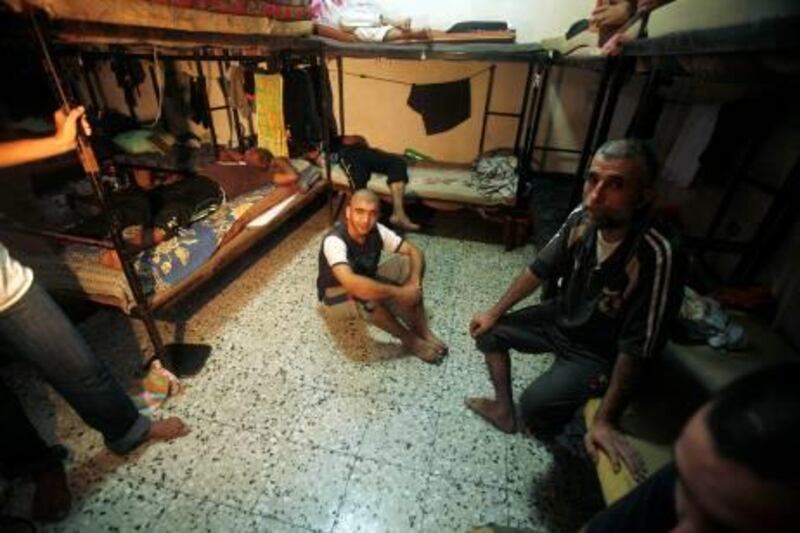GAZA CITY // Naser Suleiman admits that the prison system he runs is chaotic. The man in charge of jails in the Hamas-controlled Gaza Strip made no effort to disguise the fact during an interview recently with reporters in his office at a prison in downtown Gaza City. While responding to questions, Mr Suleiman had several conversations on his mobile phone and, at one point, jokingly waved around his pistol.
"I agree with you. There must be stricter procedures here," he said, laughing. Mr Suleiman was referring to the prison in Gaza City that houses convicted murderers and other hardened felons. It could hardly be described a "high-security" facility. Electrical wires protrude from the walls of the prison and construction debris lines the stairwell. The facility looks more like an apartment building under construction than a prison for dangerous criminals.
Just as Hamas struggles to keep order in this restive strip of land of 1.5 million people, Mr Suleiman is trying to do the same inside Gaza's prisons. And just as Israel's blockade of Gaza stunts economic growth and curtails the ambitions of everyday Gazans, it also impairs Mr Suleiman's ability to operate prisons. Authorities started moving prisoners into the still-incomplete Central Rehabilitation and Reform Centre about three months ago.
"We're still trying to finish the building - that's why you see it like this," said Mr Suleiman, who is 47 years old and wears a dark-blue police uniform and a shadow of a beard. There are three prisons in the Gaza Strip. Hamas also operates at least two detention centres, one of which is located in a home once owned by the Palestinian Authority president, Mahmoud Abbas. Human rights organisations, including Human Rights Watch, claim that torture has taken place in some of those centres.
Mr Suleiman admits that some of these allegations are true. Asked if it occurred, he said that it "happens in detention centres". He insisted, however, that the prisons are humane and actually provide a decent life. As an example, he cited the prison in Khan Younis, where there are large tracts of land for farming and playing football. At the Central Rehabilitation and Reform Centre, activities are more limited. The 150 inmates have no exercise facility. Rehabilitation mostly consists of memorising parts of the Quran in return for the possibility of having sentences reduced.
Recreation consists of playing with cards donated by the Red Cross. Simple stoves enable inmates to prepare meals in cells, which house up to 20 men and boys. "They watch television and listen to the radio in their rooms," Mr Suleiman said. "They can prepare their own food, in addition to what we provide them." Despite its location in downtown Gaza City, next to the ministry of justice, there is no security fence. Guards seem more focused on reading religious literature, while they rest their loaded weapons and stun guns on desks and cots. Some tell jokes and pass out candy to inmates as if the metals bars separating criminals from the rest of society are a mere formality.
In some rooms, prisoners serving sentences of a few years are mixed with prisoners who have been sentenced to death. "I pointed the gun to his head and the bullet accidentally came out," said Osama al Ghoul, 31, who was convicted of murdering a business associate and then sentenced to death. He explained the circumstances of the killing from a cell jammed with other inmates. Standing next to him behind blue metal bars were boys in their teens and men in their 50s. Some were convicted of relatively minor crimes such as theft.
The jail received a sudden influx of inmates two months ago - one outcome of a round-up of suspected Israeli collaborators that began in April with the execution by firing squad of two men accused of spying for Israel. The flood of new prisoners seems to have overwhelmed Mr Suleiman. He is uncertain how many prisoners the new prison contains and why they are there. Thirteen people are on death row, he said after obtaining statistics from a subordinate. A few moments later, he nonchalantly added: "I think, maybe, three or four of them are the collaborators."





